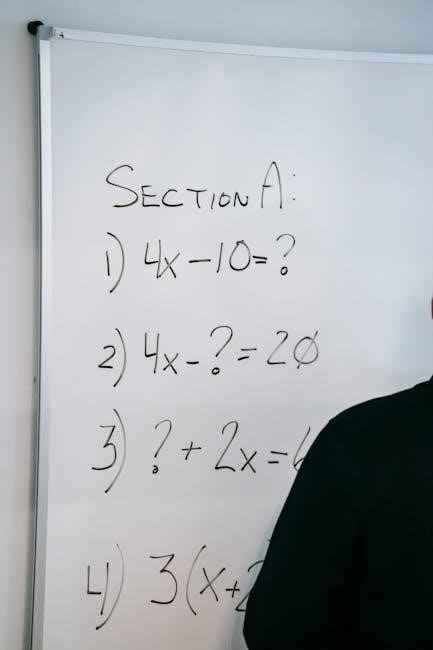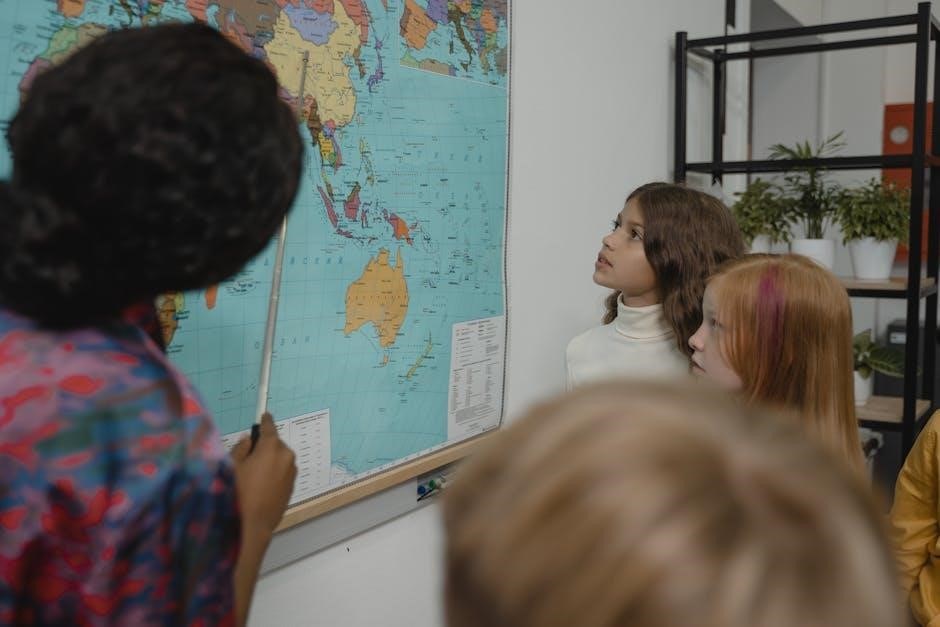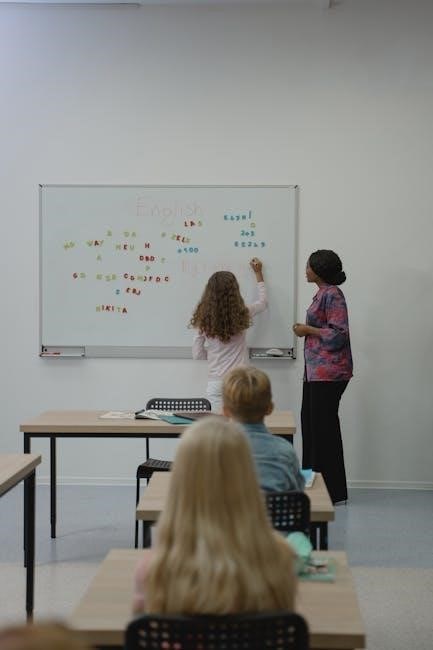Special education instructional aides play a vital role in supporting teachers and students with special needs․ They assist in creating inclusive learning environments, adapting materials, and providing individualized support to ensure students meet their educational goals․ Their work is essential for fostering academic and personal growth in students with diverse abilities․
1․1 Role and Responsibilities

Special education instructional aides assist teachers by preparing materials, supporting individualized instruction, and helping students with daily tasks․ They adapt lessons, provide behavioral support, and collaborate with educators to meet IEP goals, ensuring students receive tailored assistance to thrive academically and socially․
1․2 Importance in Special Education
Instructional aides are crucial in special education, providing personalized support to students with diverse needs․ They help bridge learning gaps, foster independence, and create inclusive environments, enabling students to access education effectively and achieve their full potential with tailored assistance and care․
Key Skills and Qualities of a Special Education Instructional Aide
Special education instructional aides must possess adaptability, patience, and strong communication skills․ They need to understand diverse learning needs, maintain organization, and demonstrate empathy while supporting students and teachers effectively in an inclusive educational setting․
2․1 Patience and Empathy
Patient and empathetic instructional aides are essential in special education, as they work with students facing diverse challenges․ Patience helps them handle behavioral difficulties calmly, while empathy allows them to understand and connect with students’ emotional needs, fostering a supportive and inclusive learning environment that promotes academic and personal growth․
2․2 Communication Skills
Effective communication is critical for special education instructional aides․ They must clearly convey instructions, actively listen to students, and collaborate with teachers and parents․ Strong verbal and non-verbal skills ensure understanding and support, helping students with diverse needs to engage and progress in their educational journey successfully․
2․3 Technical and Organizational Skills
Special education instructional aides need strong technical and organizational skills to manage materials and data efficiently․ Proficiency in educational software and tools enhances lesson delivery, while effective time management and record-keeping ensure smooth classroom operations and accurate tracking of student progress, supporting overall educational goals effectively․

How to Become a Special Education Instructional Aide
Becoming a special education instructional aide involves completing educational requirements, undergoing specialized training, and gaining practical experience to effectively support students and educators․
3․1 Educational Requirements
Becoming a special education instructional aide typically requires a high school diploma or equivalent․ Some employers prefer an associate’s degree or specialized certification in special education or a related field․ Background checks and additional training may also be mandated by schools or districts․
3․2 Training and Certification
Special education instructional aides often undergo specific training, such as paraprofessional certification or specialized courses in behavioral support and instructional strategies․ Certification requirements vary by state or employer, with some mandating background checks or continuing education to maintain credentials and stay updated on best practices in special education support․
3․3 Gaining Practical Experience
Gaining practical experience is crucial for special education instructional aides․ Many begin with internships or volunteer roles in schools, working under experienced teachers․ Hands-on training through student teaching or apprenticeships provides insight into classroom dynamics and student needs, helping aides develop the skills necessary to support diverse learners effectively․

Working with Students with Different Disabilities
Special education instructional aides work with students having diverse disabilities, such as autism, emotional disturbances, and specific learning disabilities․ They adapt strategies to meet individual needs, ensuring personalized support for each student’s unique challenges․
4․1 Understanding Common Disabilities
Understanding common disabilities, such as autism, ADHD, and specific learning disabilities, is crucial for instructional aides․ Recognizing these conditions enables aides to provide tailored support, adapt strategies, and create inclusive environments that cater to diverse student needs, fostering their academic and social growth effectively․
4․2 Tailoring Support to Individual Needs
Tailoring support involves assessing each student’s unique needs and adapting strategies accordingly․ Instructional aides work closely with teachers to implement Individualized Education Programs (IEPs), ensuring personalized approaches like task simplification and visual aids are used to meet diverse learning requirements effectively․
4․3 Strategies for Inclusive Learning
Strategies for inclusive learning involve creating environments where all students can participate meaningfully․ This includes differentiated instruction, assistive technology, and collaborative group work․ Instructional aides help adapt materials and activities, ensuring students with diverse abilities access the curriculum and engage actively in learning alongside their peers․

Collaboration with Teachers and Other Professionals
Collaboration with teachers and professionals is crucial for supporting students․ Aides assist in implementing IEPs, share insights, and work together to foster inclusive learning environments․
5․1 Teamwork in Special Education
Teamwork in special education involves instructional aides working closely with teachers and professionals to ensure cohesive support․ This collaboration promotes a unified approach to teaching, enabling tailored strategies for each student’s needs and fostering a supportive learning environment that maximizes student progress and inclusion․
5․2 Communicating with Parents and Guardians
Effective communication with parents and guardians is crucial for special education instructional aides․ Regular updates on student progress, active listening, and clear explanations of educational strategies ensure alignment with home support, fostering a collaborative partnership that benefits the student’s overall development and academic success․
5․3 Participating in IEP Meetings
Instructional aides actively contribute to IEP meetings by sharing insights on student behavior, strengths, and challenges․ Their input helps tailor goals and strategies, ensuring comprehensive support plans․ Collaboration with teachers and parents during these meetings is vital for creating personalized and effective educational programs for students with special needs․
Challenges Faced by Special Education Instructional Aides
Instructional aides face emotional and physical demands, behavioral challenges, and limited resources, requiring resilience and adaptability to support diverse student needs effectively in dynamic classroom environments․
6․1 Behavioral and Emotional Challenges
Instructional aides often encounter students with emotional disturbances or behavioral difficulties, requiring patience and tailored strategies to manage outbursts and provide consistent support, ensuring a stable learning environment while addressing individual emotional needs effectively․
6․2 Limited Resources and Support
Instructional aides often face challenges due to limited resources and support, including budget constraints, outdated materials, and inadequate training․ These limitations can hinder their ability to provide effective support, emphasizing the need for creative solutions and advocating for better-equipped environments to meet students’ diverse needs․
6․3 Emotional and Physical Demands
Special education instructional aides often face emotional challenges due to high-stress environments and physically demanding tasks, such as assisting students with mobility or behavioral support․ These demands require resilience, self-care practices, and professional development to ensure aides can maintain their well-being while providing effective student support․

Best Practices for Supporting Students
Best practices include creating inclusive environments, using assistive technologies, and implementing personalized support strategies to ensure students with special needs achieve their academic and personal goals effectively․
7․1 Creating a Positive Learning Environment
Creating a positive learning environment involves fostering respect, empathy, and inclusivity․ Aides should ensure accessibility, promote social interactions, and use visual supports to help students focus․ Encouraging open communication and celebrating achievements can build confidence and a sense of belonging among students with special needs․
7․2 Using Assistive Technology
Assistive technology empowers students with disabilities to engage actively in learning․ Tools like text-to-speech, speech-to-text, and interactive apps enhance reading, writing, and communication․ Instructional aides can collaborate with educators to identify appropriate technologies, ensuring they align with individual needs and promote independence, fostering a more inclusive and effective learning experience for all students․
7․3 Implementing Behavior Interventions
Instructional aides play a key role in supporting behavior interventions tailored to students’ needs․ They help implement strategies like positive reinforcement and redirection to manage challenging behaviors․ By maintaining consistency and clear communication, they reinforce positive behavior, creating a structured and supportive learning environment aligned with IEP goals and individual student needs․

Legal and Ethical Considerations
Special education instructional aides must adhere to laws like IDEA, ensuring confidentiality and ethical practices․ They protect student privacy, follow IEP guidelines, and maintain professional standards to provide equitable and respectful support in educational settings․
8․1 Understanding Special Education Laws
Special education laws, such as IDEA, ensure students with disabilities receive appropriate services․ Instructional aides must understand these laws to support IEP development, protect student rights, and provide services tailored to individual needs, fostering an inclusive and legally compliant educational environment for all students․
8․2 Maintaining Confidentiality
Maintaining confidentiality is crucial for instructional aides․ They handle sensitive student information, such as IEPs and medical records, which must be protected under FERPA and IDEA․ Aides must adhere to privacy protocols, ensuring only authorized personnel access records to safeguard students’ personal and educational data effectively and ethically․
8․3 Ethical Practices in Special Education
Ethical practices in special education require instructional aides to adhere to professional standards, ensuring respect, honesty, and transparency․ They must follow FERPA and IDEA guidelines, avoiding conflicts of interest and maintaining confidentiality․ Aides should promote inclusivity, respect diversity, and prioritize students’ well-being, upholding ethical behavior to support their educational and personal growth effectively․

Professional Development and Growth
Continuous learning and training enable special education instructional aides to enhance their skills, stay updated on best practices, and contribute effectively to student success in inclusive settings․
9․1 Continuous Learning Opportunities
Special education instructional aides benefit from ongoing professional development through workshops, courses, and conferences․ These opportunities enhance their understanding of new teaching strategies, technologies, and legal requirements, ensuring they provide effective support to students with diverse learning needs and stay current in their field․
9․2 Building a Career in Special Education
Building a career as a special education instructional aide involves gaining experience, pursuing specialized certifications, and seeking advanced roles․ Many aides transition into teaching or leadership positions, while others specialize in specific disabilities․ Continuous growth and dedication open doors to meaningful career advancement in this rewarding field․
9․3 Networking and Mentorship
Networking and mentorship are crucial for professional growth in special education․ Connecting with experienced professionals and seeking guidance enhances skills and confidence․ Mentorship provides valuable insights, while networking opportunities allow sharing best practices and staying updated on emerging trends, ultimately benefiting both instructional aides and the students they support․

The Future of Special Education Instructional Aides

The future of special education instructional aides involves advancing technologies, personalized learning, and expanded roles in inclusive education, ensuring better support for diverse student needs and abilities․
10․1 Emerging Trends in Special Education
Emerging trends in special education include the integration of AI-powered tools, personalized learning plans, and Universal Design for Learning (UDL) frameworks․ These innovations aim to enhance accessibility, engagement, and inclusivity for students with diverse needs․ Collaborative efforts between educators and technology developers are reshaping how instructional aides support student learning and well-being․
10․2 Impact of Technology on Special Education
Technology is transforming special education by providing assistive tools, interactive learning platforms, and virtual resources․ These innovations enable instructional aides to support students with diverse needs more effectively, fostering engagement and independence․ Assistive technologies, such as text-to-speech software and adaptive devices, are empowering students to overcome barriers and thrive in inclusive settings․
10․3 Expanding Roles and Responsibilities
The role of special education instructional aides is evolving, with increased involvement in IEP meetings, behavioral support, and academic instruction․ Technological advancements and diverse student needs are driving this expansion, requiring aides to adapt and take on more collaborative responsibilities to ensure comprehensive student support and inclusive education practices․
Special education instructional aides are vital in supporting students with special needs, ensuring inclusive education․ Their dedication empowers students to thrive, making a lasting impact on their educational journey․
11․1 Summary of Key Points
Special education instructional aides are essential in supporting students with diverse needs, assisting teachers, and fostering inclusive learning environments․ They require patience, communication skills, and adaptability․ Their role involves tailored support, collaboration with educators, and navigating challenges like behavioral issues and resource limitations․ Continuous learning and ethical practices are crucial for their effectiveness and the students’ success․
11․2 Final Thoughts on the Role of Instructional Aides
Special education instructional aides are indispensable in empowering students with special needs․ Their dedication, adaptability, and compassionate support create meaningful learning experiences․ By collaborating with teachers and families, they foster inclusivity and help students thrive academically and personally, making a lasting impact on their educational journey and future success․
